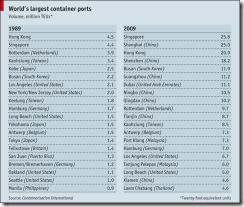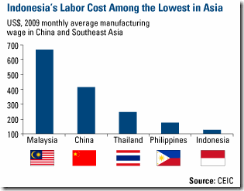The power of slow change is ubiquitous.
This from the Economist, (all bold emphasis mine)
THE changes in distribution and cargo-handling capabilities of the world's biggest container ports show the shifts that the world economy has undergone over the past two decades. The volume of cargo traded through the world’s biggest container ports has increased nearly sixfold in the past 20 years as globalisation has taken hold. Singapore has now nabbed the top spot and every other big port in 1989 has moved down the list. Twenty years ago more than half of the top 20 container ports were in America or Europe reflecting imports into both regions from around the globe. Now, Asia's strength as an exporter is more in evidence. Fourteen of the top 20 container ports are in that region, with eight in China.
This is obviously has NOT been about cheap labor (otherwise Africa should have been at the top of the list), but about trade openness.
As Asia (led by China) begun to embrace economic freedom, given the inherent economies of scale emanating the largest population combined with a start from low base, volume accrued over the years and displaced the former leaders.
From US Global Funds
The Philippines which used to be in the top 20, considering our “cheap labor” relative to our ASEAN neighbours seems to have been booted out by high labor cost economies as Malaysia (has 2 in the top 20 2009 ranking) and Thailand (1 in 2009 ranking).
Besides as we always say there are many other factors that make up operational “competitive” advantages of a country. For instance in China, low taxes and a small welfare state may have been an important contributor.
As Cato’s Alan Reynolds observed,
``Lacking the equivalent of Social Security or Medicare/Medicaid, China has no payroll taxes at all, no capital gains tax, and only a 15-25% tax on corporate profits.”
Therefore, people who argue based on specious analysis from “single aggregate variable” such as cheap labor will always be wrong.


1 comment:
Europe and the US cannot expand their container ports' volume fast enough because they will be asking first how much carbon emission was created by those more production, more trade cargos :-)
Post a Comment